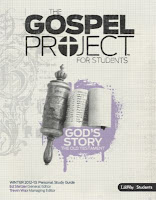Introducing God (A Conversation with The Gospel Project)
This week our church begins using The Gospel Project as curriculum for our Sunday School groups. My intent here is not to replace the material (as it is good enough), nor to write a commentary on it (as it is understandable), but to only add to the conversation in a way that may help our students and teachers hit the topics from other angles.
When it comes to origins the church has been deceived into believing that there is only one conversation worth having. And that conversation, seems to be more of a debate than a dialogue. Was the universe created by God? The winner is determined only by whom can yell the most science at his opponent and thus beating him into empirical submission.
The opening chapters of Genesis are not a scientific shouting match. This is the opening scene of a story. As such the primary intent of the creation account is not to provide a scientific record. The intent is to reveal the Bible’s main character. The message is not, “This is how God created the world.” The message is, “This is God.”
The Bible has entered the conversation of origins attempting to prove to us nothing, but desiring rather to give us a story that explains everything. In the beginning God created the heavens and the earth. The fact that He did it is not in question by the author. There is no debate. There is not even a dialogue here. This is a declaration. In the Hebrew text there are only seven words and the action of the story is quickly underway.
The first seven words of the Bible tell us who did it, now the author weaves together a rhythmic script of the way He did it. We move from declaration to introduction. Yet, it is here that we cheat ourselves if we only debate origins. We lose God in the debate. The story is lost in the science of it all. Lecture me on science and my mind will soon wonder. Tell me a good story and you will have my attention for hours.
Genesis 1 and 2 is a great story. By telling us the way God created the world the author is introducing us to who God is. The bacterial flagellum screams at us intelligent design, but the human soul craves to know more about a person than whether or not they are intelligent. When was the last time you asked a person, “What’s your IQ?”
We want to know if anyone cares. Are you angry? Is something wrong? Where are you from? Why are you here? Does he ever smile? What makes her laugh? Is there love here? How will you impact my story? These are the questions that magnetize our soul and connect us with other people. If this is what we want to know of other people, how much more do we want to know this of God?
This is the concern of Genesis 1 and 2. By telling us what God did the storyteller shares with us what God is like. So when we read the opening sequence of Genesis, let us lay aside our flagellum for a moment. I am not suggesting that we also lay aside our intelligence, but I am saying, watch the show. See the character. By watching the way He does what He does, get to know Him. Dare to ask the storyteller as he shares Genesis 1 and 2, what is God like?
More to come . . .


Comments